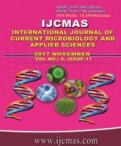


 National Academy of Agricultural Sciences (NAAS)
National Academy of Agricultural Sciences (NAAS)

|
PRINT ISSN : 2319-7692
Online ISSN : 2319-7706 Issues : 12 per year Publisher : Excellent Publishers Email : editorijcmas@gmail.com / submit@ijcmas.com Editor-in-chief: Dr.M.Prakash Index Copernicus ICV 2018: 95.39 NAAS RATING 2020: 5.38 |
The overdependence of chemical fertilizers in agriculture leads to decrease the fertility of soil and increase the chemical pollution. Thus, it is essential to adopt a new technology which is eco-friendly, cost-effective and reliable. Biofertilizer (Azotobacter, Azospirillum, etc) have been identified as an alternative to chemical fertilizer to increase soil fertility and crop production in sustainable farming. Therefore the present experiment with different isolates of Azotobacter sp. was carried out to find out effective isolate for plant growth promoting activities and biological control. In case of in vitro screening for plant growth promoting efficacy, it was found that chilli seeds bacterized with AZT8 exhibited the highest per cent seed germination (98%) which was followed by AZT6 (86 %) and AZT4 (81%). Root length (4.18cm) and shoot length of chilli seedlings (6.5 cm) were found maximum for the isolate AZT8. The calculated vigour index based on germination percentage, root length and shoot length was also recorded maximum for the isolate AZT8 (1105.445) followed by AZT6 (937.4) and AZT4 (805.95). In case of in vitro antagonistic potentiality test, AZT3 was found the most active isolate against Rhizoctonia solani giving an inhibition zone of 1.1 cm and also 72.2% growth inhibition. Another isolate showing better result, was AZT4, exhibiting zone of inhibition of 0.7 cm and mycelia inhibition of 61.1%. Therefore it may be concluded from the present experiment that AZT8 as plant growth promoting activities and AZT3 as bio control agent can be used in West Bengal.
 |
 |
 |
 |
 |